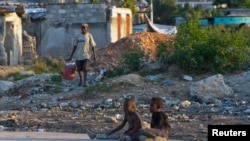UNITED NATIONS —
The United Nations has rejected a claim for compensation filed on behalf of 5,000 Haitian victims of a cholera outbreak, saying the world body is protected by immunity. The claim, filed in 2011, sought millions of dollars from the United Nations, saying its peacekeepers brought the deadly disease to Haiti.
The water-borne disease had not been documented in Haiti for decades when it appeared several months after the January 2010 earthquake that left thousands of people homeless and living in makeshift camps.
Newly arrived U.N. peacekeepers from Nepal were suspected of bringing the disease into the country and spreading it into the water supply through poor sanitation at their camp. Cholera is endemic in Nepal, and the strain responsible for Haiti’s epidemic is one that is prevalent throughout South Asia.
U.N. Spokesman Martin Nesirky told reporters Thursday that the U.N. had reviewed the petitioners’ claim and that Secretary-General Ban Ki-moon had called the president of Haiti to inform him of its decision.
“Today, the United Nations advised the claimants’ representatives that the claims are not receivable pursuant to Section 29 of the Convention on the Privileges and Immunities of the United Nations," said Nesirky. "The Secretary-General telephoned Haitian President Michel Martelly to inform him of the decision and to reiterate the commitment of the United Nations to the elimination of cholera in Haiti.”
In addition to $50,000 for each person sickened by the outbreak and $100,000 for the family of each victim who died as a result of it, the petitioners also sought to have the United Nations install a national water and sanitation system to control the epidemic and issue a public apology.
Brian Concannon is the Director of the Institute for Justice and Democracy in Haiti, which filed the compensation claim. He told VOA by telephone from Arizona [where he was on a family holiday] that he was disappointed by the U.N.’s decision, but not surprised, and that the claim for compensation would not end here.
“The U.N. said we are not going to comply with our obligation to provide an alternate mechanism, and so the only way that our victims can get justice is to go to a national court. So we are now preparing to file in a national court,” he said.
Concannon said they could file in Haiti, New York or even in Europe, and that that decision would be made in the coming weeks.
The water-borne disease had not been documented in Haiti for decades when it appeared several months after the January 2010 earthquake that left thousands of people homeless and living in makeshift camps.
Newly arrived U.N. peacekeepers from Nepal were suspected of bringing the disease into the country and spreading it into the water supply through poor sanitation at their camp. Cholera is endemic in Nepal, and the strain responsible for Haiti’s epidemic is one that is prevalent throughout South Asia.
U.N. Spokesman Martin Nesirky told reporters Thursday that the U.N. had reviewed the petitioners’ claim and that Secretary-General Ban Ki-moon had called the president of Haiti to inform him of its decision.
“Today, the United Nations advised the claimants’ representatives that the claims are not receivable pursuant to Section 29 of the Convention on the Privileges and Immunities of the United Nations," said Nesirky. "The Secretary-General telephoned Haitian President Michel Martelly to inform him of the decision and to reiterate the commitment of the United Nations to the elimination of cholera in Haiti.”
In addition to $50,000 for each person sickened by the outbreak and $100,000 for the family of each victim who died as a result of it, the petitioners also sought to have the United Nations install a national water and sanitation system to control the epidemic and issue a public apology.
Brian Concannon is the Director of the Institute for Justice and Democracy in Haiti, which filed the compensation claim. He told VOA by telephone from Arizona [where he was on a family holiday] that he was disappointed by the U.N.’s decision, but not surprised, and that the claim for compensation would not end here.
“The U.N. said we are not going to comply with our obligation to provide an alternate mechanism, and so the only way that our victims can get justice is to go to a national court. So we are now preparing to file in a national court,” he said.
Concannon said they could file in Haiti, New York or even in Europe, and that that decision would be made in the coming weeks.




